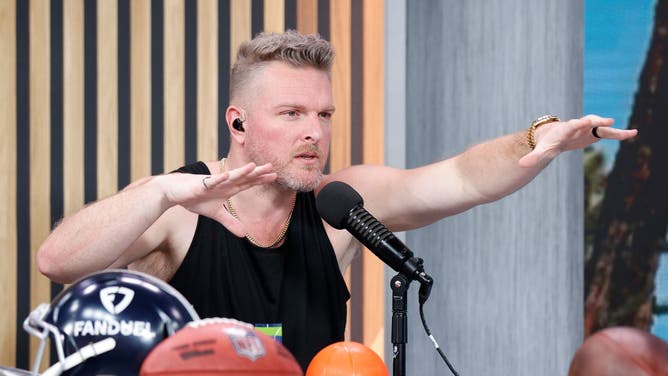ESPN Can No Longer Build Stars, So It Bought One In Pat McAfee | Bobby Burack
Stardom in sports media used to run through ESPN. To be a star, working there was a prerequisite.
Chris Berman, Dan Patrick, Keith Olbermann, Stuart Scott, Bill Simmons, and Stephen A. Smith are products of ESPN. The network turned them into household names; names often more famous than the athletes they covered.
But ESPN's star-making prowess has worn. The channel has since positioned the likes of Maria Taylor, Jemele Hill, Mina Kimes, Bomani Jones, Katie Nolan, and Kendrick Perkins as next-gen stars -- each to no avail.
Sure, ESPN employs personalities who influence the conversation. Yet Stephen A. Smith, Scott Van Pelt, Mike Greenberg, Michael Wilbon, and Tony Kornheiser are all over 50 years of age.
Under 50, the biggest names are not employees of ESPN. Barstool Sports' Dave Portnoy, Big Cat, and PFT Commenter are more relevant than any name ESPN has tried to elevate up late. As is Nate Burleson, Shams Charania, and Draymond Green.
And Pat McAfee.

PHOENIX, ARIZONA - FEBRUARY 09: Former NFL player and host Pat McAfee speaks on radio row ahead of Super Bowl LVII at the Phoenix Convention Center on February 9, 2023 in Phoenix, Arizona. (Photo by Mike Lawrie/Getty Images)
But as of today, McAfee is an employee of ESPN. Tuesday, ESPN announced a multi-year agreement with McAfee. His daily program will air on ESPN, ESPN+, and the ESPN YouTube channel this fall.
ESPN couldn't find the next Dan Patrick, or build the next Stephen A, or groom the next Stuart Scott. So they bought him.
The specifics of the deal are unknown, other than McAfee walked away from a four-year, $120 million contract with FanDuel with over two years remaining.
Suffice to say the investment is substantial.
McAfee is larger than any personality in whom ESPN has invested in recent years. At 36, he's among the most viral voices in the conversation.
Unlike Ryan Clark, McAfee wasn't force-fed to viewers. Unlike Bomani Jones, McAfee didn't have Stephen A. Smith as a lead-in.
Rather, his viewers sought him.
McAfee created his own brand outside the corporate media machine.
His YouTube channel has over 2 million subscribers, with live episodes averaging as much as 300,000 views a day.
Investing in McAfee is, in a way, an admission for ESPN. Pat McAfee embodies much of what ESPN has steered away from.
He's a middle-American white man who doesn't subscribe to groupthink or political correctness. McAfee doesn't feign outrage over the number of white NFL coaches, the use of the phrase "Mount Rushmore," or the ascension of white players in the NBA.
He doesn't chastise Aaron Rodgers for his opposition to vaccine mandates. In fact, he's Rodgers' closest media ally. Rodgers -- the most frequently criticized athlete at ESPN -- appears on McAfee's show each Tuesday. We expect that to continue.
Like Dan Patrick, McAfee appeals to the average sports fan. He's not overtly political. He's fun, he's one of the guys. Pat McAfee made sports-talk fun again.
McAfee was a counter to ESPN's voyage into social issues, racial hysteria, and grievance-based programming.
ESPN calculated it was big enough to change viewers, to convert them into the type of fans Disney envisioned.
ESPN calculated wrong.
As the network sought to convince fans that Colin Kaepernick had merit, LeBron was the modern-day Muhammad Ali, and that Mina Kimes was a football authority -- viewers responded by flocking to smaller alternatives.
McAfee's success is a direct result of ESPN's disregard for its own viewers.
Now, ESPN turns to Pat McAfee to win back the viewers it lost by neglecting the very fan he personifies, and be the star ESPN can no longer create.